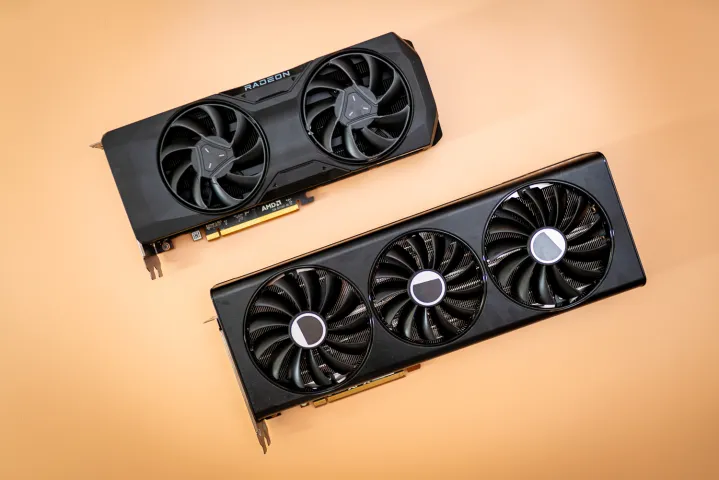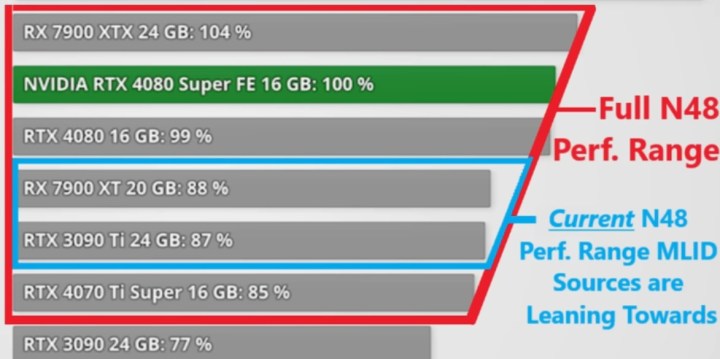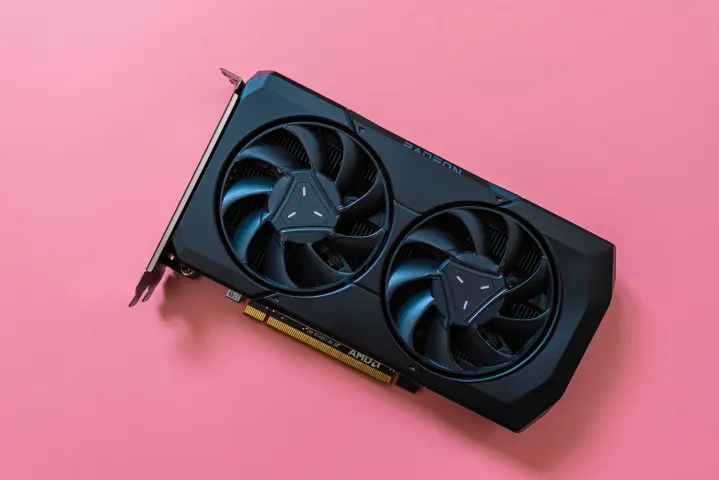
AMD’s RX 9000 series is right around the corner, and it’s almost ready to compete against some of the best graphics cards. While leaks about the lineup have been scarce for many months, things are getting better. As we’re leading up to the official announcement at CES 2025, a lot of information has come out.
Initially referred to as the RX 8000 series, the RDNA 4 generation is now expected to come with a name change and an interesting spread of GPUs. Here’s everything you need to know about the RX 9000 series.
AMD RX 9000 series: availability

A year ago, many thought that we’d see the RX 9000 series in 2024. Some were optimistic and speculated that AMD would launch it in the summer of 2024. That didn’t happen, and now, we know for a fact when these cards will be announced — but their release dates are still a subject of speculation.
AMD is set to announce the RX 9000 series during its CES 2025 keynote, which will take place at 11 a.m. PT on January 6. It’s currently unclear which cards will be announced, but most leakers agree that we’ll see at least the presumed flagship RX 9070 XT, with perhaps the non-XT version or the more budget-friendly RX 9060 XT thrown into the mix.
As for availability, it’s anybody’s guess right now. It’s likely that the RX 9070 XT will be available by the end of January, although current reports say that it’ll be hard to come by until February.
By all accounts, it seems like AMD will launch at least two to four GPUs under the RDNA 4 umbrella, and those cards are likely to be available within the first quarter of the year. For specifics, we have to wait until January 6 — and possibly beyond, depending on which cards will be included in the first announcement.
AMD Radeon RX 9000 series: specs and architecture
| AMD RDNA 4 | |
| Process node | TSMC N4P |
| Architecture | RDNA 4 |
| Chip | Navi 48, Navi 44 |
| Memory type | GDDR6 |
| Maximum bus width | 256-bit |
| Maximum clock speed | 3GHz-3.3GHz |
It became clear very early on that AMD may not be trying to compete against the best of Nvidia’s RTX 50-series this time around. Various hardware leakers have been saying for well over a year that even AMD’s flagship may only rival the likes of Nvidia’s upcoming RTX 5070, and this is reflected in the rumored specs for each card.
AMD’s senior vice president, Jack Huynh, spoke to Tom’s Hardware, pretty much confirming what leakers have been saying: AMD’s plan for the RX 9000 series is to focus on the mainstream PC gaming market. Huynh said: “Do I want to go after 10% of the total addressable market (TAM) or 80%? I’m an 80% kind of guy because I don’t want AMD to be the company that only people who can afford Porsches and Ferraris can buy. We want to build gaming systems for millions of users.”
This mindset implies that Nvidia’s two most high-end cards, the RTX 5080 and the RTX 5090, will not see any direct competition in this generation.
We’ll dive into GPU-specific leaks below, but first, let’s talk about what to expect from RDNA 4 as a whole.

So far, it seems that the lineup itself might be pretty slim. Only two GPUs have been mentioned: Navi 48 and Navi 44. Some leakers, such as Moore’s Law Is Dead, claim that the flagship used to be Navi 41, which would’ve been capable of challenging at least Nvidia’s RTX 5080, but it is said to have been scrapped alongside the Navi 42. That leaves us with the Navi 48 as the flagship card and the Navi 44 as the mid-to-low-range option.
AMD doesn’t appear to be introducing any major architectural changes in RDNA 4. Hardware leakers, such as RedGamingTech, used to mention that AMD may be switching to an MCM design in RDNA 4. Those rumors have since gone quiet — we’re likely looking at a monolithic die.
Package sizes:
Navi 23: 35 x 35mm
Navi 44: 29 x 29 mm— Everest (@Olrak29_) October 14, 2024
According to Olrak29 on X, AMD may be reducing package sizes in the new generation by a considerable amount, scaling down to 29 x 29 millimeters for Navi 44 — which is the smaller of the two GPUs. AMD is also likely to switch to a more efficient node, which most leakers currently expect to be the TSMC 4nm process (most likely the N4P).
The company is said to be sticking to GDDR6 memory modules — for reference, Nvidia has used GDDR6X in the RTX 40-series and will use GDDR7 in Blackwell. Kepler_L2, a known leaker, also claims that AMD may limit the bandwidth to 18Gbps, whereas Nvidia’s RTX 5080 might use faster 30Gbps modules. Again, AMD may have planned to use GDDR7 VRAM in the high-end portion of the lineup, which is most likely not going to make it to market.
Only 18Gbps 🤔
— Kepler (@Kepler_L2) April 23, 2024
On the upside, many leakers agree that AMD’s focus may have been firmly on ray tracing with the RX 9000 series. We might see the introduction of more specialized ray tracing hardware that would help boost such workloads at a hardware level.
AMD CEO Lisa Su also promised major gaming improvements in the new architecture. We know that “improvements” are subjective here, what with the flagship potentially not rivaling AMD’s current top GPU, but it’s still possible that we’ll see generational gains in that mainstream bracket.
AMD RX 9000 series: lineup
Confirmed, this is RX 9070 XT.
— Hoang Anh Phu (@AnhPhuH) December 23, 2024
For many months, almost everyone expected AMD’s next-gen lineup to be called the RX 8000 series. It made sense, as this would’ve followed the naming scheme that AMD had used since the RX 5000 series. Many — myself included — also thought that the flagship would be the RX 8800 XT, marking the step-down from the previous RX 7900 XTX.
In December, that narrative changed. Many sources reported that the RDNA 4 lineup was now being referred to as the AMD RX 9000 (or RX 90) series, and the flagship was most likely going to be the RX 9070 XT. This is pretty sudden, as just a couple of weeks before the news broke, we’ve seen the RX 8800 XT mentioned in Seasonic’s power calculator.
AMD may have had a last-minute name change, but the two GPUs have remained the same. Below, I’ll talk about what we can expect from the RX 9070 XT and the RX 9060 XT.
AMD Radeon RX 9070 XT

The Radeon RX 9070 XT is currently expected to be the star of the RDNA 4 lineup, and it’s also the GPU I’m most excited about in 2025.
Current leaks estimate that the RX 9070 XT will be based on the Navi 48 XTX GPU, and it’ll come with 4,096 cores. It’s also said to feature 16GB of VRAM across a 256-bit bus, clocked at 18 to 20Gbps. The maximum memory bandwidth to expect from such a configuration is 640GB/s.
The card is also said to offer an impressive maximum clock speed that may hit as high as 3.1GHz. All of this will be achieved at a total board power of roughly 260 watts, as per VideoCardz.
These specs position the RX 9070 XT as a direct rival to cards like Nvidia’s RTX 5070, and early performance leaks do nothing to dispel that notion. Although many believed that AMD might deliver something along the lines of the Nvidia RTX 4080 (and some still believe that), it seems like a more conservative estimate is needed — but performance leaks are really all over the place.
For example, zhangzhonghao on the Chiphell forums recently shared that the RTX 4080 and the RX 9070 XT are within just 5% of each other. No matter which one’s the winner in that equation, that’d be great news for the RX 9070 XT, but most leakers tend to disagree. Previous estimates pinpoint the RX 9070 XT at around the same level as the RX 7900 XT.
This kind of performance level puts the RX 9070 XT in a difficult position, one where it’ll be forced to compete not just against cards like the RTX 4070 Super or the RTX 4070 Ti Super but also AMD’s own RDNA 3 offerings. As a result, a lot of it will come down to pricing, which is still unknown at this stage.
Many say that the card may cost up to $700, which would make sense given the fact that it might be marketed as a competitor to the RX 7900 XT. However, with the latter priced at $650 or less, it might be a hard sell for AMD. It’s also possible that AMD may price the 9070 XT lower, in the $500 range, which would make it a great value offer, similar to the RX 7800 XT.
This GPU is most likely to be the first to hit the market, with some availability expected before the end of January. AMD may also be working on an RX 9070 non-XT.
AMD Radeon RX 9060 XT

The rumored RX 9060 XT is still a huge enigma. It’s expected to be based on the Navi 44 GPU, which may, in turn, come in two flavors: one with a 192-bit bus, and the other with a 128-bit bus.
We might be looking at a similar situation to what we’ve seen in the RX 7000 series, where AMD released an RX 7600 and an RX 7600 XT. The latter had twice the VRAM, sitting at a whopping 16GB, but still limited to a 128-bit memory bus. If the above leak is true, we might still see an RX 9060 with 8GB memory and an RX 9060 XT with 16GB, but the XT model might now get a wider, 192-bit interface.
4️⃣8️⃣ 2️⃣5️⃣6️⃣ 6️⃣4️⃣ 2️⃣0️⃣
4️⃣8️⃣ 2️⃣5️⃣6️⃣ 6️⃣4️⃣ 1️⃣8️⃣
4️⃣8️⃣ 1️⃣9️⃣2️⃣ 4️⃣8️⃣ 1️⃣9️⃣
4️⃣4️⃣ 1️⃣2️⃣8️⃣ 3️⃣2️⃣ 1️⃣8️⃣
🦉👼🏾 1️⃣6️⃣ 0️⃣4️⃣ 2️⃣0️⃣ 2️⃣5️⃣6️⃣ 3️⃣2️⃣ 8️⃣5️⃣3️⃣3️⃣
🇺🇸🏞️ 0️⃣4️⃣ 0️⃣2️⃣ 6️⃣4️⃣ 6️⃣4️⃣0️⃣0️⃣— All The Watts!! (@All_The_Watts) August 28, 2024
However, some leakers, such as All_The_Watts, only mention just one variant of the Navi 44. This same leaker revealed that the RX 9060 XT might come with 32 compute units (CUs) and 18Gbps of memory speed, which is the same as the RX 7600. However, architectural improvements between RDNA 3 and RDNA 4 should still hopefully provide the GPU with some sort of a boost, even if these specs check out.
Availability for this card is expected around March this year. If the previous generation’s pricing is anything to go by, the RX 9060 XT should cost around $250 to $350.




